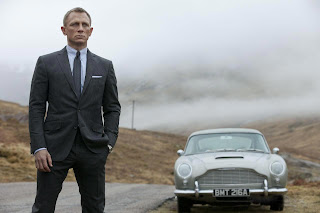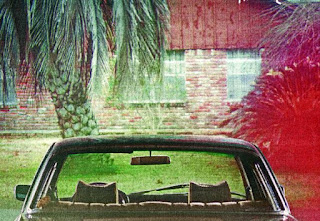Skyfall Review
A bold new Bond
Full spoiler-free review by Isaac Handelman
No Bond film has dared to go where Skyfall does. Throughout all twenty-two films in the long-enduring franchise, never once has Bond’s past been explored to any measurable extent. Never once has the relationship between Bond and M been explored to great lengths. Never once has James Bond been pushed this far -- not physically, but psychologically. This is the film that Quantum of Solace should have been. This is the worthy followup to the masterful Casino Royale that we’ve all been waiting for. This is a definitive 21st Century Bond outing.
If you thought Casino Royale’s opening chase sequence had reached the epitome of intensity, prepare to be shown otherwise. The bombastic, breathless start to Skyfall practically dwarfs what was found in Daniel Craig’s first Bond outing. After a riveting chase aboard a train, Bond is accidentally shot during the mission and presumed dead by M and the rest of MI6. Soon, however, a shocking terrorist attack on England’s espionage organization brings Bond back into action, along with a little help from MI6’s new Quartermaster (Ben Whishaw, whose youthful quirkiness makes me hope for his return in future installments), fellow agent Eve (Naomie Harris) and the usual assortment of MI6 operatives.
Casino and Quantum were often criticized for their lack of an iconic central antagonist, and Skyfall takes a notable swing at righting that wrong. Javier Bardem’s Silva is, in a word, flamboyant: a quite obviously insane and yet diabolically intelligent rival for Bond, and Bardem imbues the part with a creepy, sinister aura that keeps the character’s actions unpredictable throughout. Unfortunately, his motivations for his terrorist actions are never fully explained, and his seemingly storied past is not fleshed out to the extent that would have allowed him a place alongside classic Bond villains like Blofeld and Goldfinger, which slightly lessens the impact of the film's finale. Still, the character is a solid step up from what’s been offered up in Bond’s other recent adventures.
Though it’s chock full of explosive set-pieces and slickly directed fight sequences, the real draw of Skyfall is where is takes its characters. Bond is pushed to the outer limits of his psyche; upon his return from death, he’s beginning to show his age. He’s unable to steadily aim a pistol. He can’t complete a round of pull ups without needing to take a break and catch his breath. He’s unable to even pass a simple psychological evaluation. But M sends him out into the field anyways. Why? Is it because she has no care for 007? Or is she sentimental about Bond? Or is it something else? Well, that’s one of the film’s central conceits. It explores the relationship between two of the most iconic characters in the history of a fifty year old franchise.
Even more impressively, and to an extent that will surprise you, Skyfall explores Bond’s childhood and past, something past series entires had never -- never -- even begun to do. That doesn’t mean we get clear answers to every question we’ve acquired about the illusive James Bond, but what is offered up here is extremely satisfying and leaves ample room for further exploration in future entries.
One word can be used to easily sum up Skyfall: ambitious. It isn’t scared to break down barriers that have prevented the Bond series from achieving true emotional resonance. All three Craig Bonds have deconstructed series traditions, but up until Skyfall most of these differentiations have been trivial: the placement of the opening gun-barrel sequence, the type of artists performing the opening theme song. But with Skyfall, the filmmakers are finally willing to take the Bond series in entirely new directions. But how does it manage to do this?
By going back to the basics. It’s easy to get nostalgic while watching Skyfall. Its narrative is more classically structured that Casino's or Quantum's. When Bond takes an ominous sailboat ride to the abandoned island on which Silva resides, it’s difficult not to get goosebumps just recalling all the similar moments this brings to mind from Bond’s storied past. In fact, more than anything, Skyfall is a love letter to Bond films past, but it’s also a brilliant glimpse into the future of one of the most storied franchises in cinematic history -- a future which, if the filmmakers are smart, will include the stellar Daniel Craig until he's physically incapable of taking on the role.
But I know the question you want me to answer. Is Skyfall the best Bond film ever made? Does it outclass even its ingenious predecessor Casino Royale? Does it surpass the classic status of Connery’s finest features? Of From Russia With Love or Dr. No? In all truthfulness, it’s difficult to give a definitive answer to this question, and that’s a good thing. Skyfall pays homage to Bond films past, but at the same time it’s so wonderfully divergent from the usual formula, so shockingly willing to explore the outer reaches of what we thought possible in a James Bond film, that it’s a stretch to ask for a direct comparison of quality. But if you had any doubt in the staying power of the Bond franchise -- if you had any suspicion that the series was losing steam, or that Casino Royale was simply a fluke in an otherwise aging franchise, go see Skyfall right away. In fact, if you have any love for Bond, you owe it to yourself to see Skyfall; it will constantly thrill, surprise and delight you in ways you never thought possible from a James Bond movie.
Final Score:
8.5/10
“Outstanding”




Comments
Post a Comment